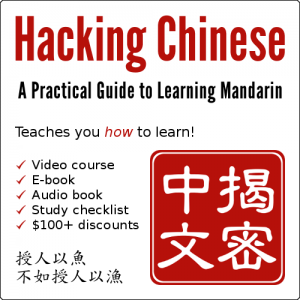 Looking back at my Chinese-learning journey, it’s easy to in hindsight identify things I could have done better. I now have fifteen years of learning and teaching under my belt, including two years in graduate school and eight years working with professional development for language teachers.
Looking back at my Chinese-learning journey, it’s easy to in hindsight identify things I could have done better. I now have fifteen years of learning and teaching under my belt, including two years in graduate school and eight years working with professional development for language teachers.
When I started learning Chinese, I hadn’t studied or even considered seriously how to learn a new language, so I mostly followed the courses I was enrolled in. In this way, I was like most students of any language. But then, I started noticing things in my education that didn’t make sense or were missing completely. When I realised that these issues were widespread and not just something I experienced, I started writing about them, leading to the launch of Hacking Chinese in 2010.
Tune in to the Hacking Chinese Podcast to listen to the related episode (#215):
Available on Apple Podcasts, Spotify, YouTube and many other platforms!
Giving myself advice as an intermediate student of Chinese
 While I think I had ironed out the more serious problems with the way I learnt by the time I reached the intermediate stage, there are some things I really wish I had known back then. In this article, we’re going to power up the time machine again and head back to 2009 to help a younger me learn in a better way.
While I think I had ironed out the more serious problems with the way I learnt by the time I reached the intermediate stage, there are some things I really wish I had known back then. In this article, we’re going to power up the time machine again and head back to 2009 to help a younger me learn in a better way.
Of course, I have chosen advice that’s relevant not just to me, but to all students. In fact, you don’t even have to be an intermediate learner to benefit from them, as they can be applied to everyone beyond the beginner stage.
Still, I will focus on three pieces of advice that I would give myself as an intermediate learner of Chinese. I will make sure to present my advice in a manner that makes sense even if you’re not familiar with the story of how I learnt Chinese, but if you want to know more about that, check out the following articles:
- Where it all started
- Learning Mandarin in Sweden
- My first year in Taiwan
- My second year in Taiwan
- Returning to Sweden
- Graduate program in Taiwan
- Teaching, writing, learning
Intermediate Chinese? What does that even mean?
It’s notoriously difficult to describe language proficiency, so take the division into beginner, intermediate and advanced with a grain of salt. In very rough terms, I count myself as a beginner during my first year of learning Chinese (parts 1 and 2 in the story of how I learnt Chinese), as an intermediate student from my second year in Taiwan up to applying for a master’s degree program (parts 3 and 4), and finally as an advanced student from then up until now (parts 5, 6 and 7).
Here’s a list of all three articles in this series:
- The time machine, part 1: Beginner
- The time machine, part 2: Intermediate
- The time machine, part 3: Advanced
Advice to myself as an intermediate student of Chinese: Immerse yourself; input is king!
The overarching advice for the intermediate level is to take immersion seriously. This has nothing to do with where you live, as it’s perfectly possible to immerse yourself in Chinese from the comfort of your home. It’s also possible to live in China for ten years and still not learn much Chinese.
The only substantial difference between the two is that living in a Chinese-speaking environment tends to increase motivation and makes language immersion more practical. The advice I have to offer here is equally relevant regardless of where you live.
Immersion at home or: Why you don’t have to go abroad to learn Chinese
Identifying your destination; plotting a path
The goal should be to read and listen to as much Chinese you can make sense of as possible. This is a remarkably simple method as it can be described in just one sentence. This doesn’t make it easy to apply, however, in the same way that walking 10,000 miles is not easy, even if walking itself is not hard.
 Before we have a look at three pieces of advice for intermediate learners, I want to point out that your long-term goals for learning Chinese matter a lot.
Before we have a look at three pieces of advice for intermediate learners, I want to point out that your long-term goals for learning Chinese matter a lot.
I’m assuming that you are aiming for a well-rounded competence in all areas without having a very narrow application in mind, but if you are in fact learning Chinese with some specific goal in mind, my advice might no longer apply.
Goal setting and plotting a path to success is one of the things I discuss in my course Hacking Chinese: A Practical Guide to Learning Mandarin, so check that out if you want more structured and comprehensive advice!
Still, there are very few cases I can think of where massive amounts of input is not the right way to go, and all the ones I can think of are related to getting good grades or passing exams, all of which are short-term goals.
If you think a test like HSK offers a good roadmap for learning Chinese, you need to think again. The same is true for most formal courses as well, although to a lesser extent.
Intermediate Chinese advice #1: Read and listen extensively, a lot
To reach an advanced level, you need to immerse yourself in thousands upon thousands of hours of written and spoken language. Yes, taking a course can help, and sure, study some grammar if you want to, but no amount of explicit learning will take you across the intermediate plateau and beyond.
There are a few things to unpack here. First, we have intensive and extensive reading. These concepts are equally applicable to listening, but I will talk mostly about reading here to make the text clearer. I’ll return to some specific points about listening later, but assume it says “reading and listening” when it says “reading” for now.
- Intensive reading is what you are doing in class and what most intermediate learners of Chinese, including myself at that level, are doing too much of. Intensive reading is when you spend a lot of time on short, difficult texts, containing many unfamiliar words, grammar patterns and the like. If reading feels like deciphering a code or an intelligence test, you’re doing intensive reading.
- Extensive reading is the opposite. It’s when you spend a lot of time on long, easy texts, containing very few novel words, grammar patterns and the like. Because these texts are easier, reading can be sustained for much longer, you can cover an order of magnitude more content. It’s also more enjoyable! If you’re able to focus the story, information or meaning in the text without being disrupted by language you don’t understand, then you’re doing extensive reading.
I’ve written more about extensive reading here: An introduction to extensive reading for Chinese learners
As an intermediate student, I spent too much time on difficult texts. While I did a fair amount of extensive listening, I was enrolled in (for me) exceedingly difficult courses that required me to prepare an hour for every hour in class, even though we covered articles that were usually only a page long.
While this makes you feel like you’re making progress (you can read harder texts), it’s at least partly a waste of time, especially if done for too long without room to focus on easier content too.
Balancing your Chinese learning at the intermediate level
 In Paul Nation’s four strands model, three of the four strands deal with language you are mostly familiar with. Only one of the strands, language-focused learning, deals with challenging content, such as intensive reading. That strand also contains any explicit learning of vocabulary, grammar and pronunciation.
In Paul Nation’s four strands model, three of the four strands deal with language you are mostly familiar with. Only one of the strands, language-focused learning, deals with challenging content, such as intensive reading. That strand also contains any explicit learning of vocabulary, grammar and pronunciation.
Nation recommends equal balance to the four strands, which means that intensive reading should only take up a small part of your total study time. While it can be debated exactly how much time you should spend on intensive reading, try to do extensive reading at least ten times as much as you do intensive reading.
While I did some extensive reading as an intermediate learner too, I would say the relationship between intensive and extensive reading was the opposite for me. This is something I would have changed if I really had a time machine!
What I didn’t realise back then, is how much extensive reading you need to do. We’re not talking about reading a graded reader or two, we’re talking about reading everything you find at a suitable level! Naturally, this doesn’t only apply to intermediate learners, but is equally valid for advanced learners as well, but more about this in the next article in this series.
Extensive reading is great, but don’t forget extensive listening
 Listening is even more important than reading, at least until you reach an advanced level. The reason I talked about reading first is that it’s much harder to get done, so you should prioritise it over listening when planning.
Listening is even more important than reading, at least until you reach an advanced level. The reason I talked about reading first is that it’s much harder to get done, so you should prioritise it over listening when planning.
One way of putting it is that reading requires higher time quality than listening does, so you should schedule it first. I wrote more about this here: Time quality: Studying the right thing at the right time.
However, even after reading as much as you can, you have lots of time left for listening. It’s not a clever idea to read while driving, washing the dishes or jogging, but you can absolutely listen while doing all those things.
As I have discussed many times here on Hacking Chinese, it’s possible to squeeze in dozens of hours of listening every week if you really try. I won’t repeat all the details about how to do that here, but rather point you to three important articles:
- 7 ideas for smooth and effortless Chinese listening practice
- The time barrel: How to find more time to study Chinese
- The forking path: A human approach to learning Chinese
7 ideas for smooth and effortless Chinese listening practice
Intermediate Chinese advice #2: Use hobbies, interests and needs to increase motivation
As a beginner, you’re mostly restricted to reading things written for you, and in the listening department, you’re confined to beginner podcasts and videos. We looked at that in the previous article in this series, and you can also check out more here if you’re a beginner: The best Chinese reading practice for beginners.
The great thing about having broken through to the intermediate level is that you have more options. You are still not ready for most authentic content (as in content created for native speakers by native speakers), as this will count as intensive reading and listening, but there are now so many resources to choose from that there are no longer any good excuses to not read and listening extensively.
If you don’t know what to read, check out: The 10 best free Chinese reading resources for beginner, intermediate and advanced learners.
The 10 best free Chinese reading resources for beginner, intermediate and advanced learners
And if you don’t know what to listen to, you’ll find plenty of recommendations here: The 10 best free Chinese listening resources for beginner, intermediate and advanced learners.
The 10 best free Chinese listening resources for beginner, intermediate and advanced learners
Traversing the intermediate plateau
There’s a new problem on the horizon, though: motivation.
As a beginner, you constantly receive positive feedback regarding your learning. You can feel how your Chinese improves, you can deal with more situations and it’s exciting to explore a new language. These things wear off, however, and that’s when you’ve reached the intermediate plateau.
The intermediate plateau is mostly a cognitive illusion, because it’s not true that you have stopped learning, it’s just that anything you learn makes up a decreasing proportion of your total knowledge, so it doesn’t feel like you’re making progress.
As a beginner, learning a hundred words might double your total number, but adding a hundred words when you already know two thousand is only an increase of 5%. Considering that these extra 5% are also less frequently used, they might not make a noticeable difference in your comprehension.
I’ve written more about this problem here: How to get past the intermediate Chinese learning plateau.
Finding a power source that will take you across the intermediate plateau
If you want to get past the intermediate plateau, you need to find reading and listening content you find interesting. To do this, you need to hi-jack your hobbies and interests and use them to read and listen to more Chinese. These can be related to Chinese language and culture, but they don’t have to.
Here’s a simple method to explore your options:
- Get a blank sheet of paper, a pencil and a timer
- Set a 10-minute timer and write down as many things as you can that you enjoy doing, regardless of language
- Go through the list and evaluate each item from a Chinese-learning perspective
- Create a second list of options worth exploring further
- Work your way through the list, one item at a time, and see how you can use your interests to power your Chinese learning
When you pick what options to explore first, start with those that both seem reasonable from a difficulty perspective and that you genuinely enjoy. Minimise difficulty, maximise enjoyment. Some things will be too hard, so you might need to wait with those, but most things can work, albeit not in the same manner and at the same level as in your native language.
Unlocking new areas of interest in Chinese
You should also explore different approaches to each activity. Let’s say you enjoy science and technology. It’s unrealistic to think you can dive directly into the same type of materials you enjoy in your native language. Similarly, even though you might be smack in the middle of 李永乐老师’s audience, you will probably find his videos extremely challenging.
Still, you can steer your reading and listening towards science and technology, as there is plenty of learner-oriented content that focuses on these topics. Sure, it will take some extra effort to select content that is both at a suitable level and about a suitable topic, but it’s well worth it!
Also, note that there can be huge differences in difficulty levels between superficially similar content. Don’t discard a whole area of interest just because you tried one resource and it turned out to be too hard; there might be others that are more suitable for your level.
Narrow reading and narrow listening in Chinese
You should also expect new topics to be hard to begin with, but then become easier as you read and listen more. There’s a specific method that is particularly suitable for unlocking a new area of the language, called “narrow reading” or “narrow listening”. The idea is that you read and listen to several texts about the same topic. Not just the same general area, but about exactly the same thing.
A good example would be reading ten different news articles about exactly the same event. The first reading will of course be hard, but the tenth will qualify as extensive reading. I’ve written more about this here: How narrow listening and reading can help you learn Chinese.
How narrow reading and listening can help you bridge the gap to real Chinese
Another example: Let’s say you enjoy cooking. While it might be daunting, even scary, to watch your first Chinese cooking video on YouTube, if you watch different people cook the same dish over and over, you’ll understand more of what they’re saying. This is also true if you follow a specific person because you get used to the way they speak and the language they use.
I once taught a student who was extremely interested in Chinese food and cooking. While I don’t know the details, she spent an awful lot of time both watching cooking videos and cooking food with Chinese friends. After having taught in that program for ten years, I can say that she was easily the best student after a full year of studying.
Hobbies are powerful. Use them. Your first attempt to utilise your interests for learning Chinese will not be a walk in the park, but it will be rewarding if you stick with it!
Intermediate Chinese advice #3: Spend less time on handwriting
For our final piece of advice, we’re going to approach this from the other end by looking at a specific form of language-focused learning that many students spend too much time on: handwriting. When I was at an intermediate level, I had already decided that teaching Chinese was one of my motivations for continuing learning, but I still think that I spent too much time on handwriting.
The role of handwriting in Chinese language education is much too complicated to cover in this article, but I have written about it in more detail here To put it briefly, I think most students benefit from spending some time with handwriting early on, along with acquiring a basic understanding of how the writing system works.
This knowledge will help you make sense of characters and will have a positive impact on your reading ability as well. For general advice regarding Chinese characters, check this article: My best advice on how to learn Chinese characters.
The problem is that if you try to learn to handwrite everything you learn to read, you’ll spend more time on handwriting than all other skills combined.
This is not good!
Handwriting characters shouldn’t take up a majority of your study time
In theory, it sounds okay that you want to have a balanced proficiency and be able to read, type and write characters by hand, but this gives the false impression that because the outcome (the resulting proficiency) is balanced, it also means that the time investment needed to get there is also balanced.
Nothing could be further from the truth. As anyone who has tried can attest, learning characters to a level where you can read and type is significantly easier than learning to write everything by hand. By focusing less on handwriting, you free up a lot of time you can use to read and listen more.
The underlying assumption here is of course that handwriting is not particularly u in and of itself in a modern, digital society. If you do need to write by hand, such as when filling out a form or similar, you will always have access to a dictionary.
Now that I think about it, I have never been required to write Chinese by hand outside a classroom in a situation where I couldn’t look things up on my phone, and this is true for most advanced learners. Indeed, even native speakers don’t write much by hand anymore, which is why character amnesia is a thing.
Read more here: Do you have to learn to write Chinese characters by hand?
Handwriting Chinese in formal education
The exception is of course formal education. Many courses require you to be able to write by hand, and if that’s the case, you don’t have much choice. Still, you might be able to influence this and should at least try. Maybe your teacher can make an exception, maybe she will allow you to focus on handwriting only a subset of the characters you are learning, maybe you can compensate by doing something else.
It’s important to understand that the discussion about grades in formal education introduces a new set of goals for your learning that might not be aligned with your own goals. If you really care about your grades, you will need to sacrifice otherwise sound strategies that would work in the real world but aren’t suited to your course. I wrote more about getting good grades here: How to get good grades when studying Chinese.
The bottom line is this: If you have a good reason to focus on handwriting, then by all means do so. If you can’t come up with such a reason, learn to write a core set of characters by hand, but save yourself hundreds of hours of sweat and tears by not learning to write everything by hand. Invest those hours into meaningful reading and listening instead!
Conclusion: Intermediate learners, immerse yourselves!
Now that you have learnt the basics of the language in terms of vocabulary and grammar, it’s time to take immersion seriously. This is true for those of you who study in your home country as well as those who study in China. The former group will need to work harder to create an immersion environment, but the latter group can’t sit back and relax either!
Do whatever it takes to increase the amount of Chinese you read and listen to. Choose topics you like, follow people you find interesting, and spend that extra time to find motivating content. Reading and listening a lot is simple advice, but it is hard to keep going day after day, week after week, month after month. But if you do, you’ll reap the rewards!
To free up more time to do this, don’t focus too much on language-focused learning, such as handwriting, grammar and the like.
In the next instalment in this series, we’ll get back into the time machine and jump forward a few years to discuss what advice I would offer myself as an advanced learner. If you are already an advanced learner and have read this far, please leave a comment below with some good advice you would have offered yourself as an intermediate learner!

4 comments
Thanks for the writeup. As an intermediate learner, it can feel like even immersion won’t be enough, but it sounds like I just need to have some faith and keep plugging along! The hardest part seems to be tricking my brain into going from “chinese->english->meaning” to “chinese->meaning” when immersing. I’ve also run the numbers and agree that you basically need to read 100% of the available graded readers because there are so few of them.
For narrow content, I’ve really been enjoying 抖音 since the algorithm will tailor videos to your interests almost automatically, plus there’s never a real risk of running out of interesting content. You can really use the addictive qualities of the algorithm to the benefit of your Chinese learning.
You will make progress if you persist; you are moving forward even it doesn’t always feel like that! And yes, reading all graded readers is a good start. 🙂 I’m working on a structured approach to listening (new course under construction), because currently, listening is even harder than reading when it comes to finding and navigating resources. I think the translation issue you mention will solve itself over time, especially if you focus on content at the right level (i.e. not too hard). I talked a little bit about mental translation in this Q&A episode!
Mental translation only occurs in contexts where much of the material is not understood. Once the material is understood, the mental translation stops automatically.
This is not an argument for all material being “comprehensible” (plus one learning level).
There is a benefit from listening to material that is more than plus one level too advanced. I call this “acclimating”. You get used to native level speed and complexity. And over time, this material too becomes more and more comprehensible.
Thank you Ollie for an awesome site. 祝福您!Janette
I agree! It can be tricky to balance comprehensible input against harder content. on the one hand, most students feel discouraged when they don’t understand enough, but on the other hand, sometimes diving into harder content is necessary to adapt too. I wrote about this in a very old article here: Triggering quantum leaps in Chinese listening ability.